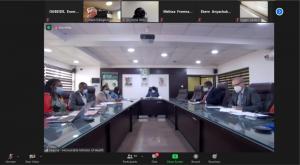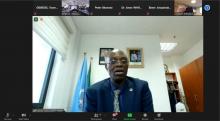Nigeria launches the implementation of Malaria eradication fund
Abuja, 15 April, 2021 - On the 14 April 2021, Nigeria launched the implementation the Global Fund 2021-2023 Malaria grant towards support to the elimination of the disease and for building resilient sustainable system for health across the country.
At a short physical and virtual ceremony, in Abuja, the Minister of Health, Dr Osagie Ehnaire, said the grant will accelerate Nigeria’s progress towards reducing the malaria burden in the country as well as strengthening the health system. The launching is a follow up of the Presidential launch of the Global Fund to Fight AIDS, TB and Malaria (GFATM) grant to Nigeria and marks the beginning of the implementation of the Global Fund 2021-2023 malaria grant in Nigeria.
The. Minister said although Nigeria in the past few years recorded reduction in malaria burden and deaths, there is still much work to do to achieve a zero-burden status as the country still has a high case burden.
“Malaria remains a public health challenge. While Nigeria witnessed largest reduction in malaria death in 2019 …we must be mindful of other challenges posed by COVID-19 and work to mitigate the impact. We appreciate all the partners that have been working with us to achieving the desired goal.”
He also assured that government would fulfil all grant conditions, including the counterpart financing.
In a similar vein, Mark Edington, the Divisional Head of Grant Management of Global Funds, speaking via Zoom, commended Nigeria for kick-starting the implementation of the malaria grant implementation despite the ongoing fight against the COVID-19 pandemic.
He said that in recognition of the need for additional investment, the Global Funds is ready to provide more funds to continue supporting response against the pandemic, and would shortly use the US government’s contribution of $3.5 billion to offer new funds to Nigeria to support PPE, community support, risk communication and logistics. “We also encourage the malaria programme to include PPE and other adaptions needed to ensure that the malaria campaigns are implemented on time despite COVID-19. We should put risk mitigation in place to reduce the spread of COVID-19, he added.
In the goodwill message, the World Health Organization Country Representative to Nigeria (WR) Dr Walter Kazadi Mulombo appreciated the Minister for organizing the important event to launch the Malaria specific component of the Global Fund grant in Nigeria.
The WR, assured Nigeria of WHO’s unalloyed commitment to continuing partnership with Federal Ministry of Health (FMoH), and all other partners through provision of technical support and guidance to implement the activities necessary to meet the National goals.
The WR, represented Dr Anne Eudes Jean Baptiste of WHO said, though Nigeria has made remarkable progress in malaria control, with decline in prevalence from 42% in 2010 to 23% in 2018, the country should not rest on its oars, as the World Malaria Report 2020 estimated that Nigeria alone accounts for 27% (61million cases) of malaria cases, and ranks highest in the list of contributors to the global burden of disease.
“As a strategic partner of the FMOH and one of The Global Fund’s collaborative global partners, based on complementary capabilities, mandates and resources to support countries end AIDS, end TB and eliminate malaria while strengthening country health systems resilience, WHO would like to encourage the Government of Nigeria to ensure that activities under this grant are implemented within planned periods and with greatest attention to quality of care”.
Other organizations represented at the launch include the US President’s Malaria Initiative, DfID, RBM partnership, and all the GF grant implementing agencies.
To date, the GFATM has invested more than US$2.6 billion in Nigeria. The investments have helped expand health services across the country, supporting more than 1.5 million people with lifesaving HIV treatment and treating 138,500 people with TB in 2020 alone.
Between 2017 and 2020, the investments also contributed to the distribution of more than 100 million mosquito nets to protect people from malaria, while building resilient and sustainable systems for health.
Technical Contacts:
Dr Dr Jean Baptiste, Anne Eudes. Email: jeana [at] who.int (jeana[at]who[dot]int); Tel: +234 813 173 6281
Dr Lynda Ozor; Email: ozorl [at] who.int (ozorl[at]who[dot]int); Tel: +234 803 402 0832




